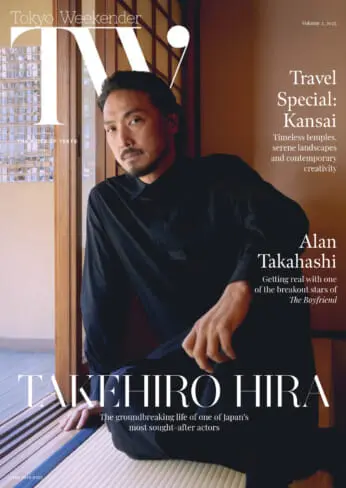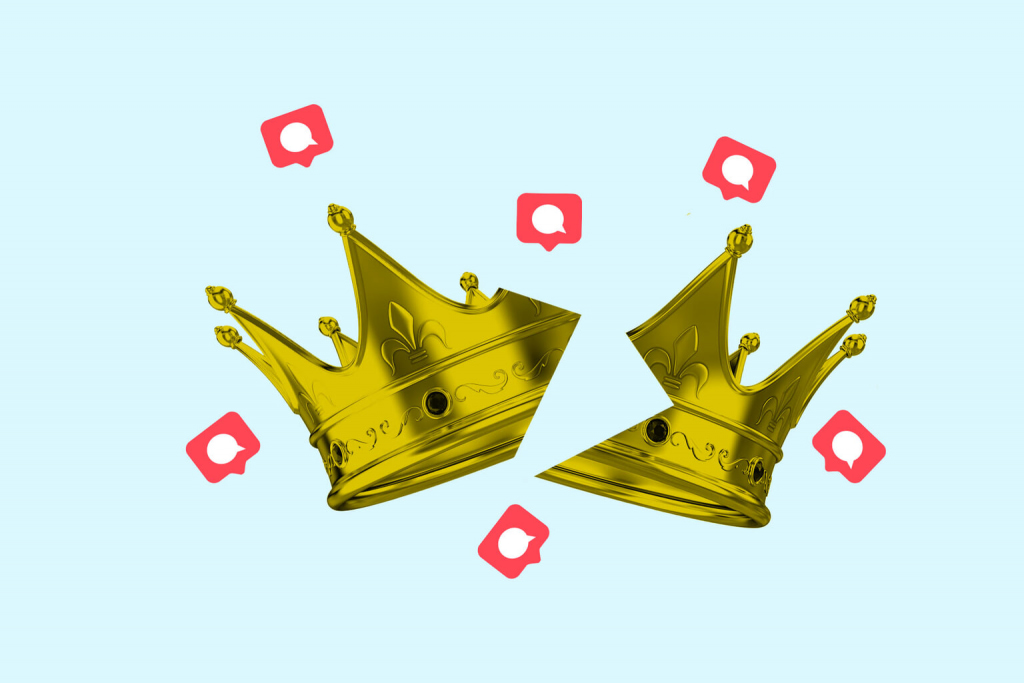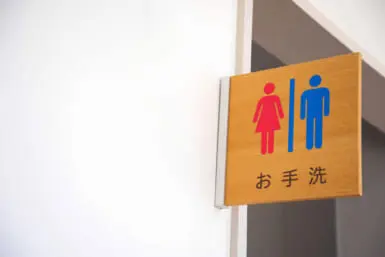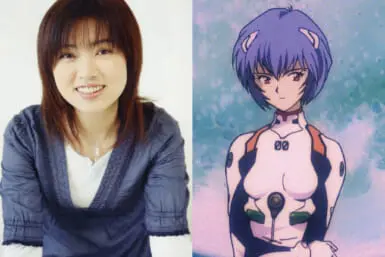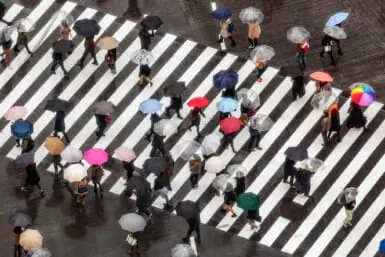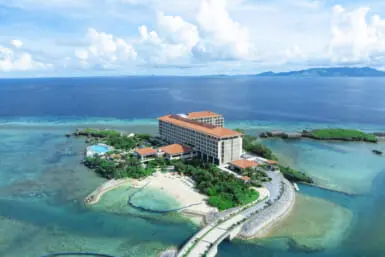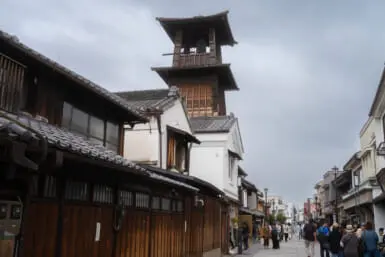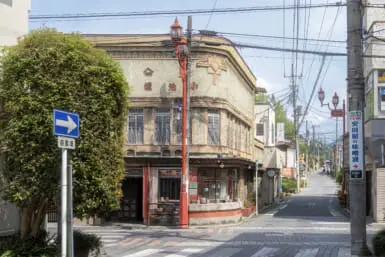And then there were 17. Following the marriage of Mako and Kei Komuro this week, the Imperial family got smaller again as the princess lost her royal status. It means there are now 50 fewer members than there were at the end of World War II. The shrinking numbers have consequently reignited the succession debate.
Currently, the future of the oldest hereditary monarchy is dependent on whether or not 15-year-old Prince Hisahito one day produces a male heir. It’s a lot of pressure to put on his and his potential future wife’s shoulders. So, is it time to finally break with tradition and allow a female figurehead? While opinion polls suggest the public is in favor of an empress regnant or matrilineal emperor, conservatives in the government aren’t so enthusiastic.
Also this week, there’s the latest on Shinzo Abe’s (in)famous masks from last year. Remember them? There’s good news as the coronavirus cases continue to fall and the vaccination rate goes above 70 percent. In Hiroshima it’s sad news as atomic bomb survivor Sunao Tsuboi passes away. As for sport, gymnast Mai Murakami finishes her career in style while baseball star Shohei Ohtani continues to make headlines even when not playing.
What Next for the Imperial Family?
Due to her marriage this week, Mako Komuro became the ninth Japanese princess to lose her royal status since 1945. With so many women departing and few male heirs, there are serious concerns for the future of the Imperial family. Earlier this year, a panel created to look into securing a stable line of succession announced that the current line must remain unchanged. According to Chief Cabinet Secretary Hirokazu Matsuno, Prime Minister Kishida will continue to respect the findings of the panel. However, as the family gets smaller, calls for reform are getting bigger.
Go-Sakuramachi was the last empress regnant before the Imperial Household Law of 1889 barred females from ruling. Though the law was amended in 1947, the male-only succession stipulation remained in place. With no male heirs born in the four decades after 1965, parliament discussed revising the law to allow women to ascend to the throne in the early 2000s. The public and Prime Minister Junichiro Koizumi were for the change, conservative lawmakers weren’t. Following the birth of Prince Hisahito in 2006, deliberations related to the succession controversy subsided.
“Horrified, Scared and Saddened”: Mako Opens up about Engagement
For Mako there will no doubt be some relief to be leaving all the pressures of royal life behind her. The scrutiny on the recently turned 30-year-old and her new husband has been intense since their engagement in 2017. The couple addressed this in their first joint media appearance in four years. “For the past few years, incorrect information was treated as if it was true. I’m very saddened that Mako-san had problems with her physical and mental health due to defamation,” said Komuro.
“Kei was said to have made decisions only by himself,” added Mako. “There were one-sided speculations saying that he was ignoring my own feelings. I was horrified, scared and saddened by the fact that false information has been taken as fact and that unfounded stories have spread.” The pair provided written responses to questions rather than taking any directly. Asked about future worries, she said, “If I have to pick the biggest concern, it would be continued libel against myself or my family, or Kei-san or Kei-san’s family.”
Covid-19 Cases Continue to Fall
On Monday, the Tokyo Metropolitan Government reported 17 new coronavirus cases, the lowest number this year. Thursday marked the 12th consecutive day that the figure stayed below 50 in the capital. With the numbers continuing to decline nationwide, more and more restrictions are being lifted. On Monday, bars and restaurants (that have been certified for Covid-19 safety measures) in Tokyo, Osaka and several other prefectures were given the green light to extend their opening hours beyond 9pm. Next week, the government is also expected to ease restrictions on attendance at large-scale events.
It’s certainly good news for the Liberal Democratic Party on the week of the general election. The vaccination drive is seen as one of the main reasons for the dwindling numbers. After an incredibly slow start, Japan now ranks in the top three of G7 nations behind Canada and Italy. Government data shows that over 70 percent of the population has now been fully inoculated. Also this week, the Japanese Health Ministry approved making booster shots available to all people who’ve gone at least eight months since receiving their second dose.
A-Bomb Survivor and Campaigner Dies at 96
Anti-nuclear activist and atomic bomb survivor Sunao Tsuboi died from an irregular heartbeat cause by anemia this week. He was 96. A student at Hiroshima College of Technology, Tsuboi was 20 when “Little Boy” was dropped over his city. “I suffered burns all over my body,” he told AFP in 2016. “Naked, I tried to run away for about three hours on August 6 but finally could no longer walk.” He just about had enough energy to pick up a rock and write on the ground “Tsuboi dies here,” before losing consciousness.
Tsuboi finally regained consciousness four weeks later and couldn’t believe that the war was over. He went on to pursue a career as a math teacher. After developing aplastic anemia, he was told by a doctor to be prepared to die if he continued working. He did anyway and became a principal of a junior high school before retiring in 1986. Tsuboi then became more involved in anti-nuclear and anti-war activism, attending various demonstrations and rallies. In 2016, he shook hands and chatted with Barack Obama, the first sitting US president to visit Hiroshima.
‘Abenomasks’ Going to Waste
Deputy Chief Cabinet Secretary Yoshihiko Isozaki confirmed at a press conference on Wednesday that around 82 million unused ‘Abenomasks’ are languishing at a private storage facility. The government procured over 280 million of the much-maligned cloth masks last year due to a shortage of surgical ones. A study into the mask policy was conducted by the Board of Audit. They found that more than half of those purchased for care facilities weren’t distributed. The reason, according to Isozaki, was that they changed their procedure, only sending the masks to facilities that requested them.
Isozaki revealed the cost of storing the masks between August 2020 and March 2021 was ¥600 million. The masks themselves are said to be worth around ¥11.5 billion. From the outset, they proved a huge embarrassment for former PM Shinzo Abe. As well as being mocked for how small they were, many were also described as dirty and defective. Some people even claimed they contained insects. Despite the criticism, Isozaki defended the decision to distribute the masks. “Based on the situation at the time, I think it was appropriate,” he said.
https://www.youtube.com/watch?v=yeXBhcjBQWk
Murakami’s Golden Retirement
Japan finished the World Artistic Gymnastics Championships with two golds, five silvers and a bronze. The two triumphs came on the final day with 18-year-old Urara Ashikawa winning on the balance beam and Mai Murakami topping the podium on the floor. The latter, who also picked up a bronze on the balance beam, then announced her retirement from the sport. It was the perfect way for the 25-year-old to bow out. Double Olympic gold medalist Daiki Hashimoto had to settle for second in both of his events. Kazuki Minami, Kazuma Kaya and Hidenobu Yonekura also picked up silvers.
In baseball, Shohei Ohtani received the Commissioner’s Historic Achievement Award from Rob Manfred, a special trophy handed out to players and teams who have made significant contributions to the game. Ohtani is the 16th recipient of the honor and the first since Manfred became commissioner in 2015. “This award is not given out every year, so I know how special it is,” said the two-way star. He was also voted player of the year and the American League outstanding player by fellow major leaguers. Back at home, the Orix Buffaloes captured their first Pacific League pennant in a quarter of a century. Tokyo Yakult Swallows won the Central League.
